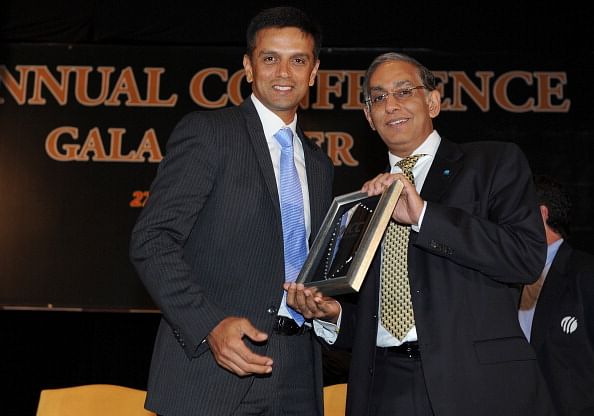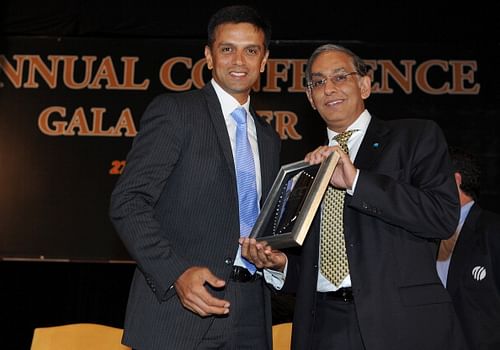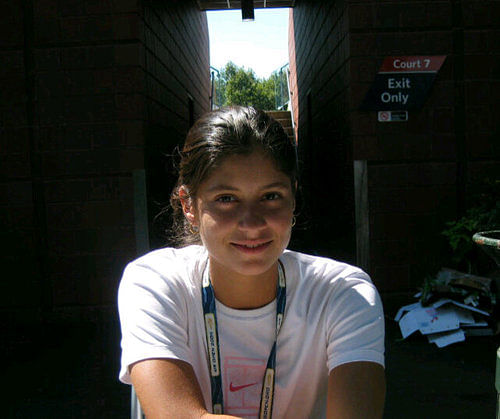
Rahul Dravid's stand on sports development in India

After Sachin Tendulker airing his views for the development of sports in India, Rahul Dravid has also echoed the same sentiments. It’s heartening to see the most prominent sportspersons in our country take proactive steps to improve the lot of sports. Dravid has his own take on the ways sports ought to develop in India and the effect they have on our youngsters: “We are obsessed with results and satisfied with mediocre ones. For top performers results are merely consequences of processes, incidental to their quests for self-perfection,” said Dravid. “The best way to produce results in sport is to take the focus away from results. In sport, results are almost never solely in one’s own hands while process of preparation and performance certainly are.” he added.
It seems like a paradox- get better results by taking the focus away from results. It holds true across all sports though. While driving a car if you were to picture to yourself bumping into every car in sight, chances are you will end up doing that. Rather than be goal-oriented, its better to be process-oriented. In sports, instinct plays a integral part in every action initiated by the sportsperson. The best way to curb and shackle instinct is by second guessing and worrying about the outcome. Its like students ought to be encouraged to study to do well, and not to avoid failure. The latter mindset will lead to the student worrying about staying afloat more than swimming in deep waters. Our country has a prevailing culture of microscopic obsession with results.
Results matter to an extent. But there’s something more important- how the results are pursued and achieved. This type of thinking is not to be used as an excuse to justify sub-par performance. It matters not if you won or lost, but how you played the game. That’s not what’s being advocated here. Winning is the primary reason to compete in professional competitions. Placing value on winning and on the way the game is played are not mutually exclusive things. For youngsters treating a game as a binary zero-sum game where their involvement and contribution are viewed as either good or bad based on whether they won or lost is doing a grave injustice to them. They need to take away positive values from sports and not bitter disappointments at losses.
Like Sachin said before, Dravid also pictures our educational institutions as the most fertile breeding grounds for budding sports talent.
“If we truly do care about sport, like we claim we do, as a nation ready to take its place in the league of developed nations, we must make it possible for our best young talents to pursue their sports as well as world-class education at the same time. We must buffer the risks of careers in sport and collect and concentrate all the indigenous and international knowledge necessary to create world-class sportsmen and sportswomen.”
More so than a balanced development of sports and education, educational institutes are best placed in terms of infrastructure and time to devote their energies towards the development of sports in India.
Dravid said: “In my view, the sacred role of sports federations is to find the right talent, give it the best possible platforms to learn, grow and perform and then ultimately to connect the talent with the sports fan in an accessible and identifiable way.”
The connect with fans is where our sports federations sometimes miss out on. In this digital age, athletes can be marketed very well online, but very few platforms in India provide a portal to express that. This website you are on is one example of that portal.
“India, with about 30% of world’s population, can only boast of a few anecdotal achievements across sporting disciplines in over six decades since independence while small countries with barely a stadium in sight are producing champion sprinters, marathoners and swimmers.”- said Dravid.
The most common excuse cited in India for a culture which does not permit sports to thrive, is lack of facilities. Playing and training facilities on one hand and lack of competitions on the other. Thing is the development of an elite athlete is not impossible without world class facilities. The best long distance runners are from Kenya, and the reason they are so good is because they have been running since childhood as a means to commute, hunt, and avoid being hunted. Running is a way of life for them. More than anything, the biggest barrier in India is the mental block that ‘we are like this only’ which places limits on us before we can even attempt anything out of the ordinary.

Kyra Shroff- Waging a lone battle?
“Today, it still takes a very brave parents to permit, let alone encourage, a talented child to carry on playing sport once high school is done.” True that. All parents want the best for their kids, but pushing them in sports is sometimes seen as a pathway to disappointment. Kyra Shroff is one example. Her father Firdaus Shroff is also her manager and is actively involved in managing her career, despite acknowledging the innumerable hardships which lie in the way. Hats off to the parents who continue to do that. And for an athlete like Rahul Dravid who urges us ahead towards becoming a nation where sports can someday be at par with education in terms of importance for our kids.